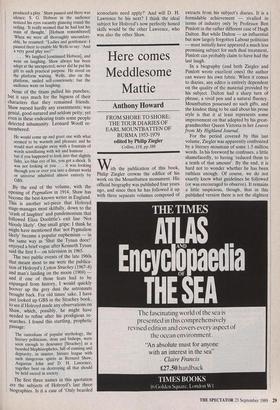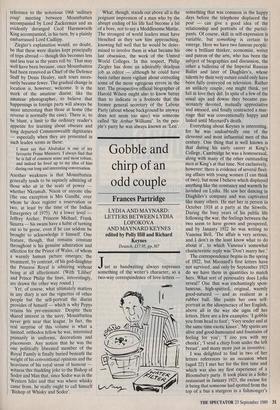Here comes Meddlesome Mattie
Anthony Howard
FROM SHORE TO SHORE: THE TOUR DIARIES OF EARL MOUNTBA 1-IEN OF BURMA 1953-1979 edited by Philip Ziegler
Collins, £18, pp.388
Wth the publication of this book, Philip Ziegler crowns the edifice of his work on the Mountbatten monument. His official biography was published four years ago, and since then he has followed it up with three separate volumes composed of extracts from his 'subject's diaries. It is a formidable achievement — rivalled in terms of industry only by Professor Ben Pimlott in the rather different case of Hugh Dalton. But while Dalton — an influential but now largely forgotten Labour politician must initially have appeared a much less promising subject for such dual treatment, Pimlott can probably claim to have had the last laugh.
In a biography (and both Ziegler and Pimlott wrote excellent ones) the author can weave his own fabric. When it comes to diaries, any editor is entirely dependent on the quality of the material provided by his subject. Dalton had a sharp turn of phrase, a vivid pen and a natural fluency. Mountbatten possessed no such gifts, and the kindest thing to be said about his prose style is that it at least represents some improvement on that adopted by his great- grandmother Queen Victoria in her Leaves from My Highland Journal.
For the period covered by this last volume, Ziegler was apparently confronted by a literary mountain of some 1.5 million words. In his foreword he confesses, a little shamefacedly, to having 'reduced them to a tenth of that amount'. By the end, it is hard not to wonder whether he has been ruthless enough. Of course, we do not exactly know what guidelines he followed (or was encouraged to observe). It remains a little suspicious, though, that in this published version there is not the slightest reference to the notorious 1968 'military Coup' meeting between Mountbatten accompanied by Lord Zuckerman and an evidently deranged Cecil Harmsworth King accompanied, in his turn, by a plainly embarrassed Lord Cudlipp.
Ziegler's explanation would, no doubt, be that these were diaries kept principally of trips abroad — though this becomes less and less true as the years roll by. That may well have been because, once Mountbatten had been removed as Chief of the Defence Staff by Denis Healey, such tours neces- sarily became fewer. The gradual change in location is, however, welcome. It is the mark of the amateur diarist, like the amateur photographer, to believe that happenings in foreign parts will always be more interesting than those at home (the reverse is normally the case). There is, to be blunt, a limit to the ordinary reader's appetite for learning about obscure and long departed Commonwealth dignitaries — especially when they are presented in such leaden terms as these:
I must say that Abubakar is one of my favourite Prime Ministers. I always find that he is full of common sense and most robust, and indeed he lived up to my idea of him during our long and interesting conversation.
Another weakness is that Mountbatten generally tends to be supinely admiring of those who sit in the seats of power — whether Nkrumah, Nixon or anyone else (the one exception is Mrs Gandhi, over whom he does register a reservation or two, at least by the time of the Indian Emergency of 1975). At a lower level — Jeffrey Archer, Princess Michael, Frank Sinatra — his swans have a habit of turning out to be geese, even if he can seldom be brought to acknowledge it himself. One feature, though, that remains constant throughout is his genuine admiration and affection for the Prince of Wales, of whom a warmly human picture emerges; the treatment, by contrast, of his god-daughter the Princess Royal is admiring without being at all affectionate. (With `Lilibee and Prince Philip the lines, interestingly, are drawn the other way round.) Yet, of course, what ultimately matters in any diary is not the vignettes of other people but the self-portrait the diarist provides of himself — which is why Pepys retains his pre-eminence. Despite their shared interest in the navy, Mountbatten never gets near that league. In fact, the real surprise of this volume is what a limited, orthodox fellow he was, interested primarily in uniforms, decorations and placements. Any notion that he was the one politically liberated member of the Royal Family is finally buried beneath the weight of his conventional opinions and the heaviness of his royal sense of humour — witness this thudding joke to the Bishop of Sodor and Man that, since Sodor was in the Western Isles and that was where whisky came from, he really ought to call himself 'Bishop of Whisky and Sodor'. What, though, stands out above all is the poignant impression of a man who by the abrupt ending of his life had become a bit of a bore, not to say a Meddlesome Mattie. The strongest of world leaders must have blenched as they saw him approaching, knowing full well that he would be deter- mined to involve them in what became his last obsession, the work of the United World Colleges. In this respect, Philip Ziegler has done an admirably deadpan job as editor — although he could have been rather more vigilant about correcting some of the more egregious errors in the text. The prospective official biographer of Harold Wilson ought also to know better than to indicate in a footnote that the former general secretary of the Labour Party (about whose background he anyway does not seem too sure) was someone called 'Sir Arthur Williams'. In the peo- ple's party he was always known as 'Len'.



























































 Previous page
Previous page